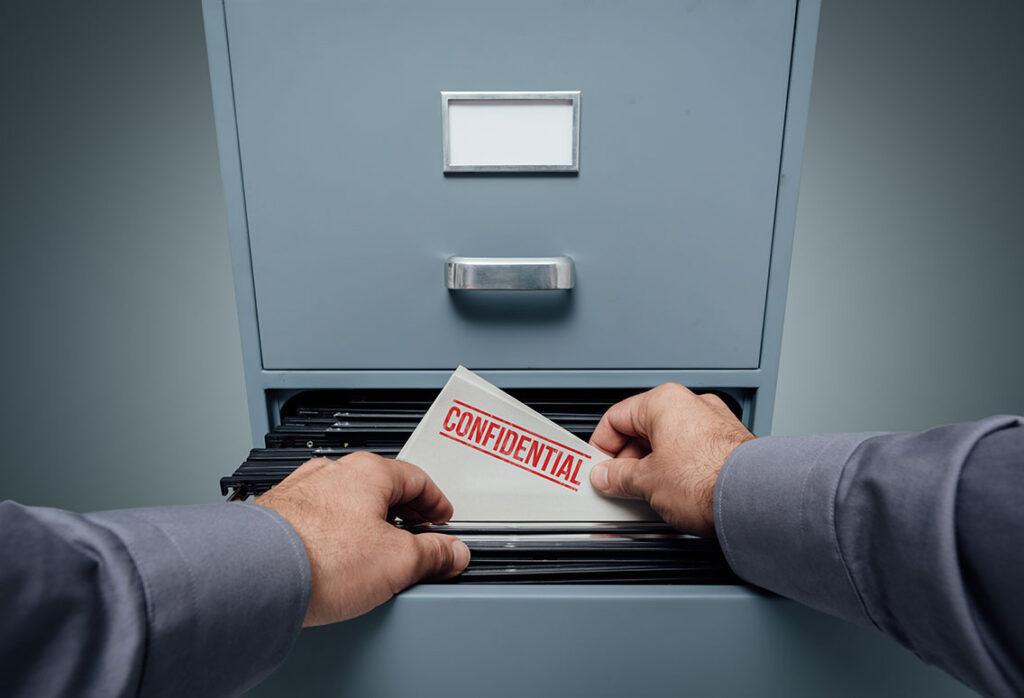For an entrepreneur seeking legal assistance in the State of California, whether in Los Angeles, Hollywood, Beverly Hills, or any other city in the Golden State, lawyer confidentiality concerns can arise because entrepreneurs, technology startups, and small businesses usually share sensitive intellectual property information, secret information, and other confidential information with their technology startup attorney to receive the highest level of consultation on their business, trademark protection strategies, contract structuring and drafting, and even company formation.
Lawyer confidentiality in a Los Angeles Law Firm is covered by the California Rule of Professional Conduct 3-100. One important aspect of this Rule is that there does not need to be a formal attorney-client relationship for attorney-client confidentiality to apply, as we have previously covered in other blogs.
Details of Lawyer Confidentiality Obligations
Client-lawyer confidentiality encompasses the attorney-client privilege, the work-product doctrine, and ethical standards of lawyer confidentiality. It applies to any information related to the representation and to any matters communicated in confidence by the client. Thus, even initial consultations between attorneys and their prospective clients will be covered.
There is an important public policy reason behind this. It is in the public’s best interest that we encourage people who seek legal assistance to speak freely and openly with a potential attorney even if the information may be legally damaging. This is information that a lawyer needs in order to effectively advise or represent this prospective client. Lawyer confidentiality is an integral part of an effective legal system.
Limited Exceptions to Lawyer Confidentiality
There are, however, certain circumstances in which a lawyer may reveal confidential information communicated by a client. Confidential information may be disclosed if a lawyer reasonably believes that such disclosure is necessary to prevent a criminal act that the lawyer reasonably believes could result in substantial bodily harm or death to an individual.
Before revealing this confidential information, the attorney must: (1) make a good faith effort to persuade the client not to commit the criminal act or attempt to prevent the death or bodily harm; and (2) inform the client of the attorney’s ability or decision to reveal the information. The disclosure must contain no more information than necessary to prevent the criminal act.
There is an important balancing act at play here, with the interests in preserving client confidentiality weighed against the need to prevent a criminal act likely to result in death or serious bodily harm. It is important to note that a lawyer has NO affirmative duty to reveal this confidential information. This is a decision for a lawyer to make based on all of the individual facts and circumstances. Under this Rule 3-100, there is no discipline for a lawyer *not* revealing confidential information that, in hindsight, could have prevented a criminal act resulting in bodily harm or death.
The Discussion under Rule 3-100 provides some factors to consider before disclosure:
- Amount of time a member has to make a decision about disclosure;
- Whether the client or a 3rd party has made similar threats before and whether they have ever acted or attempted to act upon them;
- Whether the member believes the member’s efforts to persuade the client or a third party not to engage in the criminal conduct have or have not been successful;
- The extent of adverse effect of disclosure to the client’s rights under the 5th, 6th, and 14th amendments of the U.S. Constitution or analogous rights under the California State Constitution that may result from disclosure;
- Extent of other adverse effects to the client that may result from disclosure contemplated by the member; and
- Nature and extent of information that must be disclosed to prevent the criminal act or threatened harm.

If a client takes corrective action prior to committing the criminal act, the attorney no longer may disclose this confidential information because the threat is no longer present.
These nuances to the attorney-client confidentiality Ethical Rules in California are important to know for any entrepreneur who is seeking legal representation. Knowing what is covered under lawyer confidentiality can allow an entrepreneur to speak freely about legal issues for which they are seeking assistance without feeling like they have to withhold important information before a formal relationship with an attorney has commenced.
Entrepreneurs that do not fully understand the rules on lawyer confidentiality should clarify any questions they have with the attorney with whom they are consulting and review the California Rules of Professional Conduct here: Rule 3-100 Confidential Information of a Client (ca.gov).
The Legal Framework of Lawyer Confidentiality in California
California Business and Professions Code Section 6068(e)(1)
The duty of confidentiality for lawyers in California is primarily governed by the California Business and Professions Code Section 6068(e)(1). This statute mandates that attorneys “maintain inviolate the confidence, and at every peril to himself or herself to preserve the secrets, of his or her client.” This duty is broad and encompasses all information related to the representation of a client, regardless of the source or the nature of the information.
California Rules of Professional Conduct
The California Rules of Professional Conduct further elaborate on the duty of confidentiality. Rule 1.6(a) states that a lawyer shall not reveal information protected from disclosure without the informed consent of the client, unless the disclosure is necessary to prevent a criminal act that the lawyer reasonably believes is likely to result in death or substantial bodily harm.
Scope of Confidential Information
Broad Protection
Confidentiality under California law extends to all information relating to the representation of a client. This includes not only communications between the client and attorney but also information obtained from third parties, documents, and any other materials connected to the case. The protection is not limited to sensitive or privileged information; it covers all information, regardless of its apparent importance.
Duration of Lawyer Confidentiality
The duty of confidentiality persists even after the attorney-client relationship has ended. Lawyers are obligated to protect client confidences indefinitely, ensuring that past clients can trust that their information remains secure long after their case has concluded.
Exceptions to Lawyer Confidentiality
Informed Consent
An attorney may disclose confidential information if the client gives informed consent. This means the client fully understands the potential consequences of the disclosure and voluntarily agrees to it. It is the lawyer’s responsibility to ensure that the client’s consent is informed and not obtained through coercion or misunderstanding.
Prevention of Criminal Acts
Under Rule 1.6(b), an attorney is permitted to disclose confidential information to prevent a criminal act that the lawyer reasonably believes is likely to result in death or substantial bodily harm. This exception is narrowly construed and applies only when the harm is imminent and the disclosure is necessary to prevent it.
Legal Compulsion
In some cases, lawyers may be compelled by law to disclose certain information. This can occur through court orders, subpoenas, or other legal mandates. Even in these situations, lawyers are expected to challenge the disclosure if it conflicts with the duty of confidentiality and to disclose only the minimum information required.
Practical Implications for Lawyers and Clients
Building Trust
The duty of confidentiality is fundamental to building trust between lawyers and their clients. Clients need to feel confident that they can share all relevant information with their attorney without fear of exposure. This trust enables lawyers to provide effective representation, as they have access to all the facts necessary to build a robust case.
Professional Responsibility
For lawyers, adhering to confidentiality rules is not only a legal obligation but also a professional responsibility. Breaching confidentiality can result in disciplinary action by the California State Bar, including suspension or disbarment. Maintaining confidentiality is essential for preserving the integrity of the legal profession and ensuring public trust in the legal system.
Ethical Considerations
Beyond legal and professional obligations, confidentiality involves significant ethical considerations. Lawyers must constantly balance their duty to protect client information with other ethical duties, such as honesty, integrity, and the pursuit of justice. Navigating these ethical challenges requires careful judgment and a deep commitment to the principles of the legal profession.
The Pillar of Lawyer Confidentiality in Legal Practice
Confidentiality is a pillar of the attorney-client relationship, ensuring that clients can communicate openly and honestly with their legal counsel. Under the California State Bar Rules, lawyers are bound by stringent confidentiality obligations that protect client information both during and after the representation. At L.A. Tech and Media Law Firm, we are dedicated to upholding these principles, providing our clients with the assurance that their information is safe and secure. Contact us today to learn more about our commitment to confidentiality and how we can assist with your legal needs.
Understanding the intricacies of lawyer confidentiality is crucial for both attorneys and clients. If you need expert legal advice while ensuring your privacy is protected, reach out to our team at L.A. Tech and Media Law Firm.


